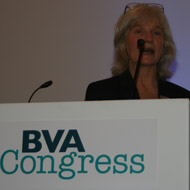What is the vet's role in domestic abuse?

Freda Scott-Park
Over the past year, the links between human and animal abuse have been increasingly discussed, but do vets know what to do if they suspect both a patient and its owner are the victims of domestic violence?
At the BVA's Congress in London today (November 21), speakers from the RSPCA, Links Group and Medics Against Violence (MAV) discussed these links and how vets and human healthcare professionals can help tackle the issue.
Opening the session, Freda Scott-Park, chair of the Links Group, described a case involving Tyson, a six-month old Rotttweiler/Staffie cross who was signed over to the RSPCA after it is believed his owner Kevin threw him down the stairs.
Shortly after this, Kevin's partner Kylie gave birth to a baby boy, Alfie, and within 10 months Kevin was charged with the baby's murder, having thrown him down the stairs.
Paula Boyden, treasurer of the Links Group and veterinary director for the Dogs Trust, said the perpetrators of domestic abuse control their human victims by threatening their pets and questioned whether this is an issue for vets.
Last year, MAV partnered with the Links Group to provide vets with training on what to do if they suspect a patient has been abused.
According to dentist and founder of MAV, Christine Goodall, past research suggests the majority of abuse victims who had visited their dentist wanted them to ask whether they were experiencing domestic violence, but most dentists did not ask because they did not know what to do about it.
Dr Goodall now trains vets, doctors, dentists and the fire service to encourage more professionals to take action. She said tell-tale signs of abuse that vets may observe in their clients are repeated facial injuries, bruises at different stages of healing and injuries with unlikely explanations.
She adapted guidance designed for dentists to create AVDR - ask, validate, document and refer. If a pet is believed to be suffering abuse and/or it is suspected the client is too, Dr Goodall advised vets to ask in a straightforward, non-judgemental way and always take the blame away from the owner. For example, by saying: "Has this happened to you too?"
Typically victims suffer more than 30 violent episodes before they speak out and attempt to leave the home six or seven times before they are successful. Many people delay leaving the home because they are worried about what will happen to their pet. Dr Goodall said as vets are in a position of respect and trust, asking the question may prompt victims to do something about their situation.
Vets are not, however, expected to give advice to the victim on leaving their violent situation, as this needs to be carefully planned by the relevant organisation. Dr Goodall recommends referral to the national domestic abuse line, the police, Women's Aid, or for pet cases, the RSPCA or SSPCA. Detailed records of injuries must be kept, however, should the case go to court.



 The Greyhound Board of Great Britain has published new vaccination guidance, with all greyhounds registered from 1 January, 2027 required to have the L4 leptospirosis vaccination, rather than L2.
The Greyhound Board of Great Britain has published new vaccination guidance, with all greyhounds registered from 1 January, 2027 required to have the L4 leptospirosis vaccination, rather than L2.